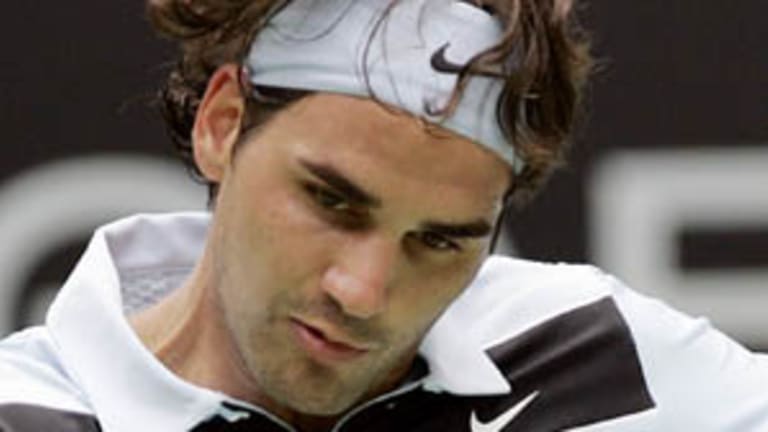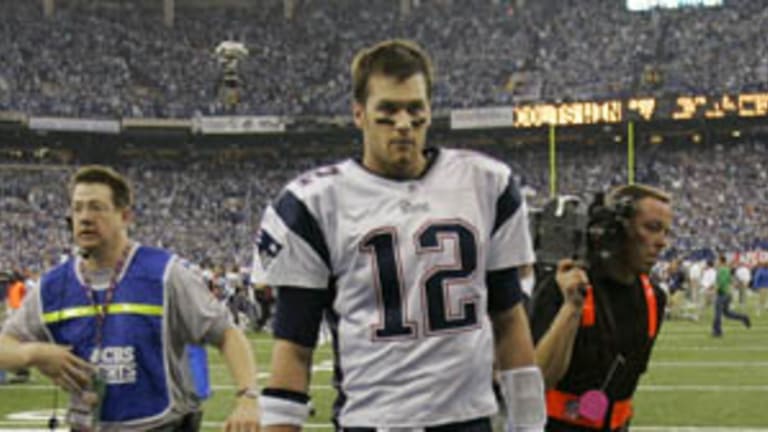Do you have trouble rooting for winners? Thinking back on my sports-fan history, I seem to have gone back and forth with little rhyme or reason. I was in awe of Michael Jordan’s excellence, but the Kobe-Shaq-Phil Lakers? I hated their arrogance, the way they thought they could only lose by some fluke or act of God. Yesterday I felt something similar watching the Colts-Patriots game. If Golden Boy Tom Brady and genius grump Bill Belichick had come down for yet another winning score at the end, I would have been devastated (and I’m not even a Colts fan). Of course, I immediately felt bad for Brady as he staggered off the field, head down, forgotten. Don’t worry, Tom, you’ll become President one day and make Jessica Alba the First Lady.
I’ve had similar feelings about tennis’ Golden Boy, Roger Federer, over the years. Loved his game and personality when he was coming up—I remember him as a 17-year-old sitting patiently in the passenger seat of my rental car with his yellow-highlighted hair (such a Euro!) as we drove around Key Biscayne looking for a suitable photo-shoot spot. We eventually propped him between two palm trees on the beach and had him smile that goofy smile we now know so well.
Later, like everyone else, I watched in awe as he became The Roger Federer, particularly at the 2004 Australian Open, which is still the most spectacular tournament of his career in my opinion. Eventually, though, I came to enjoy his very occasional losses, because they were inevitably dramatic. Remember the running backhand pass Richard Gasquet had to hit to beat him in Monte Carlo a couple years ago? Like Tom Brady, I want Federer to be proven human now and then (or maybe I just want Federer’s fans to have to admit he’s human, that he can lose without it being a total fluke or act of God). But like Michael Jordan, I realize his excellence is good for the sport. This weekend I played squash with a guy who said he flipped on the Aussie Open, then turned it off because “Federer wasn’t playing.” That’s the first time I’ve heard anyone say that in the U.S. A good sign, don’t you think?
This weekend, it was easy to root for Federer. His opponent, Novak Djokovic, is a little too cocky for me to warm up to, no matter how much I respect his game. I’ve mentioned that Rebound Ace is a good surface for Nadal, but it may be even better-suited to Federer’s strengths. It gives him just a little extra time to open up the court the way only he can do it. On Saturday, he used that time to make Djokovic, a very good young player, look very ordinary. I got the feeling at times that Federer was playing circles around him. Two moments stick out. On a key point late in the second set, Djokovic came in behind a strong approach to Federer’s backhand. The Swiss knew he needed something special, and he came up with it on the spot: An improvised, looping crosscourt pass hit at an angle no one else in the game can match. Later, on a break point in the third set, Federer showed his smarts by fooling Djokovic with a second serve up the middle. It was one of the only times all day he’d hit that serve; Federer caught his opponent leaning and took advantage of it. It proved to be Djokovic’s last chance to get back in the match.
But what struck me most was how physical Federer’s game is. We think of Nadal as the physical player, but Federer’s range, his ability to attack even hard-hit balls, the way he uses his speed to transition to net behind a routine slice ground stroke, all made Djokovic seem almost ordinary from an athletic standpoint. And while Federer can create previously unseen angles, the shot he relied on most was the straight down-the-line forehand hit with enough topspin and pace to push his opponent toward the backstop.
As for Djoko, I like his versatility and the way he plays within himself, but as yet he doesn’t have the knockout weapon—more specifically, the forehand knockout weapon—he may need to compete at the top of the rankings. This is true not only of Djokovic, but of two other rising players: Andy Murray, who lost a five-setter to Nadal last night, and Nikolay Davydenko, who is now in the quarters. Is today’s slow-court game evolving away from the killer forehand and toward their all-around styles? We’ll see, but this weekend the monster forehands—Federer’s, Nadal’s, and Fernando Gonzalez’s—were alive and well.
Now, let’s run down the human side of the tournament:
Andy Roddick: Ancic-Roddick was the match of the year so far, gritty, fiercely competitive, no nonsense. We can complain about today’s game for any number of reasons, but this had just about everything you can ask for. Serves, forehands, and backhands were all hit big; neither player was afraid of the net; the momentum went back and forth; the players played quickly and without much complaint; and you could see them pushing each other to come up with better shots at the crucial moments. Even the handshake was right on: nodded respect, no big smiles or hugs. Roddick seemed to forego a major celebration out of respect for his opponent and the match they had just played.
I think Roddick will beat Fish in four sets, the fourth ending in a tiebreaker. Roddick isn’t playing brilliantly, but he is playing with confidence. Fish is a tough guy to break and he’ll have nothing to lose, but I doubt he’ll have the mental fortitude to overcome his “brother.” He's probably content with his result so far; Roddick isn't.
Martina Hingis: I’m liking her game again. Down a set to Na Li, she struggled through a bunch of long deuce games to turn the tables. She also moved the ball well—does anyone change the ball’s direction so fluidly?—and never went for too much from a defensive position. This is something her opponent can learn from. Na Li is improving, but she has trouble when she gets ahead—not only in sets, but even in the points themselves. She routinely sets up a point well only to fail on the putaway.
Hingis-Clijsters? Despite Hingis’ superior smarts—when they play, she makes Clijsters look like a mindless ball-basher by comparison—I think the Belgian will outslug her in three. Should be good, though.

